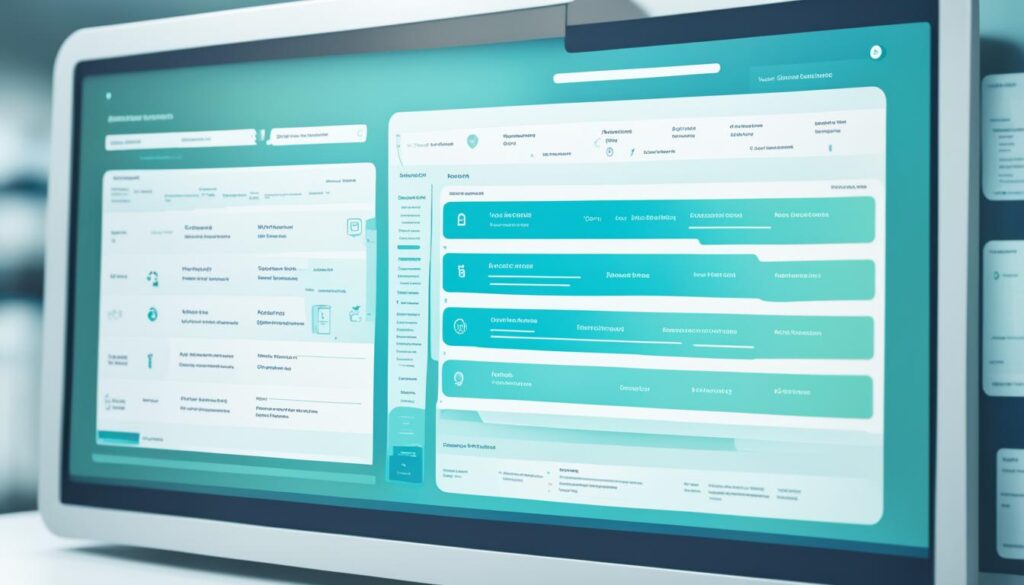Improving customer service in the healthcare industry is crucial for fostering positive patient experiences and building trust. Patients rely on healthcare providers not only for their medical needs but also for compassionate care and support. By enhancing customer service in healthcare, you can improve patient satisfaction, care quality, and ultimately strengthen the bond of trust between patients and providers.
When it comes to improving customer service in healthcare, there are several strategies that can make a significant impact. Effective communication between patients and staff, listening carefully to patient complaints and concerns, setting up efficient systems and tools, hiring the right employees, and reaching out to patients through follow-up calls are all key aspects that contribute to delivering exceptional customer service in the healthcare industry.
Key Takeaways:
- Improving customer service in healthcare is essential for patient satisfaction and trust.
- Effective communication between patients and staff is crucial in providing top-notch customer service.
- Listening carefully to patient complaints and concerns helps identify areas for improvement.
- Setting up tools and efficient systems streamlines healthcare processes and enhances customer service.
- Hiring the right employees with the necessary skills and qualifications is key.
Effective Communication Between Patients and Staff
Effective communication is essential in providing top-notch customer service in the healthcare industry. When patients visit a healthcare facility, they expect clear explanations and answers to their questions. It is crucial for healthcare providers and their staff to establish a strong line of communication with patients to ensure their needs are met and they feel understood and valued.
During an appointment, patients may have various questions or concerns, ranging from understanding their diagnosis and treatment options to clarifying medication instructions. Healthcare staff should be equipped with the knowledge and expertise to address these questions and provide thorough explanations. By doing so, they can help patients feel more confident and informed about their healthcare journey.
Treating patients with respect and courtesy is another important aspect of effective communication. Staff members should speak in a way that is easy for patients to understand, avoiding medical jargon or technical terms. Using simple and concise language can help patients feel more at ease and enable them to fully comprehend the information being shared.
It is not only healthcare professionals who play a role in effective communication. Marketers and office administrators can also contribute to ensuring patients receive quality care. By implementing communication strategies and tools, such as appointment reminders and follow-up calls, they can help facilitate seamless communication between patients and healthcare providers.
Image:

Listening Carefully to Patient’s Complaints and Concerns
One of the key aspects of providing exceptional customer service in healthcare is listening attentively to patient feedback, complaints, and concerns. By actively listening to patients, healthcare providers and their staff can gain valuable insights into areas that need improvement, enhance patient satisfaction, and strengthen the overall quality of care.
Empathy plays a crucial role in the process of addressing patient feedback. Empathizing with patients’ concerns and demonstrating compassion can create a supportive and trusting environment, allowing patients to feel heard and understood. Responding with empathy shows that healthcare providers genuinely care about their patients’ well-being, fostering a positive patient-provider relationship.
In order to effectively listen and respond to patient complaints and concerns, healthcare professionals require appropriate training. This training equips them with the necessary skills to handle challenging situations with empathy and professionalism. It helps them understand the importance of active listening, acknowledging patients’ emotions, and offering meaningful solutions.
Benefits of Listening to Patient Feedback
Listening to patient feedback goes beyond addressing individual concerns; it also provides valuable insights for improving the overall customer service experience in healthcare. By consistently collecting and analyzing feedback, healthcare providers can identify recurring issues, detect trends, and address systemic problems that may impact patient satisfaction.
Moreover, by actively seeking and responding to patient feedback, healthcare providers can enhance their understanding of patients’ needs and expectations. This knowledge allows them to make informed decisions regarding process improvements, staff training, and service enhancements, ultimately leading to increased patient satisfaction and loyalty.
Creating a feedback loop, where patients are encouraged to share their thoughts and experiences, helps foster a culture of continuous improvement within healthcare organizations. Patients who feel their feedback is valued and acted upon are more likely to trust and recommend the healthcare provider to others.
Training in Empathy and Compassion
Empathy and compassion are skills that can be developed and nurtured through training programs. Healthcare professionals can benefit from empathy training that focuses on active listening, understanding non-verbal cues, and responding with empathy. Role-playing exercises and real-life scenarios can help them practice these skills in a safe and supportive environment.
In addition to empathy training, healthcare organizations should prioritize ongoing professional development to ensure that employees stay up-to-date with best practices in customer service. By investing in training and development, healthcare providers can cultivate a team that is skilled, compassionate, and capable of delivering exceptional customer service.
By listening carefully to patient complaints and concerns, healthcare providers can gain valuable insights, improve patient satisfaction, and enhance the overall customer service experience in healthcare. Empathy and compassion, backed by appropriate training, form the foundation for creating a patient-centered healthcare environment that prioritizes the well-being of individuals.

Setting Up Tools and Efficient Systems
Utilizing electronic records and customer-service systems can greatly enhance the efficiency and effectiveness of customer service in healthcare. These tools and systems streamline processes, facilitate communication, and promote better patient experience.
Electronic records, also known as electronic health records (EHRs), enable healthcare providers to store and access patient information digitally. This allows for quick and accurate retrieval of patient data, eliminating the need for manual recordkeeping and reducing the risk of errors. EHRs also provide a comprehensive view of the patient’s medical history, enabling healthcare providers to make informed decisions and deliver personalized care.
Customer-service systems, on the other hand, are designed to optimize patient interactions and streamline administrative tasks. These systems can include appointment scheduling software, feedback collection platforms, and communication tools. Appointment scheduling software ensures smooth appointment booking and reminders, reducing no-shows and improving patient punctuality. Feedback collection platforms allow patients to provide valuable input, enabling healthcare providers to continually enhance their services. Communication tools, such as secure messaging platforms, enable convenient and secure communication between patients and healthcare providers.
By implementing electronic records and customer-service systems, healthcare organizations can unlock a range of benefits:
- Efficient appointment scheduling and management, reducing the wait time for patients and optimizing resource allocation.
- Improved accuracy and accessibility of patient information, minimizing errors and enabling better care coordination.
- Enhanced communication between patients and caregivers, fostering trust and ensuring patient satisfaction.
- Streamlined administrative tasks, freeing up staff time to focus on patient care.

Regularly updating patient information in electronic records and utilizing feedback from patient-service systems are crucial for continuous improvement. This data-driven approach enables healthcare organizations to identify areas for enhancement and tailor their services to meet the evolving needs of their patients.
Hiring the Right Employees
Hiring the right employees is crucial for providing excellent customer service in healthcare. When it comes to healthcare, employees must possess the necessary skills, knowledge, and confidence to meet the needs of patients and ensure their satisfaction. Furthermore, strict regulations and certifications are often required to maintain compliance and protect patient privacy.
When hiring employees in the healthcare industry, it is essential to consider the following:
- Skills and Expertise: Look for candidates who possess the specific skills and expertise required for the role. This includes medical assistant skills, knowledge of medical procedures, and the ability to handle patient inquiries and concerns effectively.
- Regulatory Compliance: Healthcare professionals must adhere to strict regulations, such as those outlined in the Health Insurance Portability and Accountability Act (HIPAA). Ensure potential employees are familiar with these regulations and demonstrate a commitment to comply with them.
- Certification: Depending on the position, certain certifications may be required. For example, nurses often need to be licensed and maintain their certifications. Verify any necessary certifications and ensure candidates possess the right credentials.
- Confidence and Empathy: Patients in healthcare settings often experience stress and anxiety. Ensuring that employees have a confident and empathetic demeanor can help put patients at ease and foster trust. Look for candidates who exhibit these qualities during the hiring process.
By carefully selecting employees who possess the necessary skills, comply with regulations, and demonstrate the confidence and empathy needed to interact with patients, healthcare organizations can create a positive and welcoming environment. This not only improves customer service but also contributes to overall patient satisfaction and care quality.
Example Certifications Required for Different Healthcare Roles
| Role | Certification |
|---|---|
| Registered Nurse | Registered Nurse (RN) License |
| Medical Assistant | Certified Medical Assistant (CMA) |
| Phlebotomist | Phlebotomy Certification (CPT) |
| Medical Coder | Certified Professional Coder (CPC) |

Reaching Out to Patients Through Follow-Up Calls
Follow-up calls play a crucial role in enhancing patient care and improving the overall customer service experience in healthcare. By reaching out to patients after their appointments through phone calls, text messages, or system interaction, healthcare providers can demonstrate their commitment to ongoing care and support.
These follow-up calls offer a valuable opportunity to check on patients’ well-being, address any concerns or questions that may have arisen since their visit, and ensure that their treatment plan is progressing smoothly. Furthermore, engaging in proactive and personalized follow-up care allows healthcare providers to build stronger relationships with their patients, fostering trust and confidence in the medical team’s expertise and care.
Not only do follow-up calls have the potential to positively impact patient care, but they also provide healthcare providers with a valuable source of feedback. Through these interactions, providers can gather insights and suggestions that can help further improve service quality, address any potential issues, and ensure patient satisfaction.
Managing follow-up calls effectively can be challenging, especially for busy healthcare practices. Consider leveraging the expertise of a medical answering service. These services specialize in handling patient calls and can ensure that every patient receives the attention they deserve while freeing up staff members to focus on delivering exceptional in-person care.
FAQ
How can effective communication between patients and staff improve customer service in healthcare?
Effective communication allows healthcare providers and staff to clearly explain appointments and answer patient questions, fostering a positive patient experience.
Why is listening carefully to patient complaints and concerns important for improving customer service in healthcare?
Listening to patient feedback provides an opportunity for learning and improvement. Responding with empathy and compassion shows care and helps build trust.
How can setting up tools and efficient systems enhance customer service in healthcare?
Utilizing electronic records and customer-service systems improves communication, appointment reminders, and feedback collection, leading to streamlined processes and improved services.
Why is hiring the right employees crucial for providing excellent customer service in healthcare?
The right employees have the necessary skills, knowledge, and personality to instill confidence in patients. Hiring the wrong employee can negatively impact the work environment and patient experience.
How can reaching out to patients through follow-up calls improve the customer service experience in healthcare?
Follow-up calls allow healthcare providers to continue caring for patients, gather feedback, and address any ongoing concerns, ensuring a positive experience even after patients leave the office.
